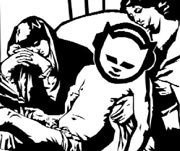TIME WAS, YOU couldn’t enjoy a media outlet without a peeved rock star shaking a jewel-encrusted fist at a lens and cursing the existence of Napster, the wildly popular Internet file sharing system that let nerds worldwide rock out on their 3-inch desktop speakers for free. For free! Nothing sticks worse in the capitalist craw than a leak in the profit net, and supply ‘n’ demand yielded millions of people worldwide who would rather download the few decent songs of a popular album than brave the X-tra large adult diaper section of Wal-Mart and fork out $17.99 for filler, puffery, and the stark disappointment of a big-label release.
It was major-label skittishness to use the Internet as a distribution method in the first place that allowed Napster to rise and fill the digital void. Suburban 15-year-olds were not willing to wait for middle-aged executives to create an interactive online solution they didn’t feel threatened by.
But with an obvious market, the big boys are ready to play now, and god save anyone who gets in the way.
Corporate decisions to develop online distribution systems may have been made with the timidity of a shaky bed wetter, but the decision to let the lawyers out of their cages was done with vicious joy. The music industry expected Napster to fall like a Scour or an MP3.com, putting up half a fight, losing the first round, and getting wrapped in heavy punitive fines and dumped into San Francisco Bay. Napster, however, brought big goony lawyers of its own, and the parties fought like great Norse gods.
The end result? In an attempt to legitimize itself, Napster agreed to shut down temporarily, pay some insane penalties, and eventually reopen as a legitimate, tribute-paying sucker like the rest of the struggling online entertainment providers. A hell of a gamble. The company is counting on its name to bring in customers, but can it get enough customers to cover the millions in ante it’s paid? Times are tough, and changing. While Napster was making its po’ boy case to the world, while the Recording Industry Association of America strutted around in its necklace of severed heads, while confused rock stars held tearful press conferences in an attempt to save humanity from piracy, something terrible happened: Peer to Peer (P2P), a harmless sounding technological concept, virtually destroyed file-swapping accountability.
Napster was run through computers in the company’s office, but programs like Gnutella and the FastTrack code allow users to form loose, decentralized networks between individual computers, networks that crumble the second mom walks in and the power gets shut off. No deep pockets to sue, no injunctions to throw around. These programs have already filled the hole left by a dormant Napster, approximately 2 billion digital files being transferred in October alone, according to Webnoize.com.
Now as the music industry figures out how to attack P2P networks, it faces another legal struggle. According to the Justice Department, some companies may be using their powers of song licensing to shut out competition from their own online business ventures, doling out the John Tesh and keeping the good stuff for themselves.
The deep pockets needed for constant legal shakedowns make one realize how little of a CD’s sticker price actually makes it to the artist, and how much of it goes to fuel the deepening morass of musical over- legislation and the ongoing legal repression of free exchange. It almost makes you want to steal your MP3s and just mail two bucks to the fan club. Whoops. See you in court.
Mark Driver








